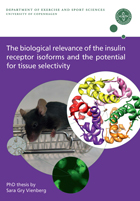PhD defence: The biological relevance of the insulin receptor isoforms and the potential for tissue selectivity
 Sara Gry Vienberg
Sara Gry Vienberg
PhD thesis
For the last twenty years it has been known that the insulin receptor exists as two alternative spliced isoforms, depending on the presence (IR-B) or absence (IR-A) of the small exon 11. The two isoforms elicit different binding affinities for insulin, IGF1 and IGF2 and are tissue dependent expressed with IR-A in the brain and IR-B in the liver.
However, the biological relevance of each isoform is still unknown, but the clear expression pattern throughout the mammalian kingdom points toward a distinctive biological role of the isoforms. This PhD project has focused on characterizing the biological relevance of the two isoforms in order to possibly apply this knowledge for future insulin therapy.
The examination of the insulin receptor isoforms’ biological role included both the production of two adenoviruses inserted with IR-A or IR-B, respectively and their role in liver biology. Furthermore, the isoforms possible role in the development of type 2 diabetes was examined in skeletal muscle and subcutaneous fat biopsies obtained from a group of obese nondiabetic, obese type 2 diabetic and healthy control subjects matched according to age and sex. Finally, two insulin analogues with a relative higher affinity for IR-A and IR-B were examined for their biological effects in vitro and in vivo.
Our data indicate that the ratio of the two isoforms is not involved in the development of insulin resistance observed in type 2 diabetes, but a decrease of overall receptor level contributes to the impairment of glucose disposal observed in type 2 diabetic subjects. Our results also suggest that it is possible to use the insulin receptor isoform preferential analogues to obtain tissue selective responses, depending on the IR-A/B expression pattern. This provides new and exciting potential for future insulin therapy.
2009, 115 pages, DKR 100,-
ISBN: 978 87 917 71 248
Time
Tuesday the 10. November 2009 at 14:00 o'clock
Place
Auditorium 1, August Krogh Building, Universitetsparken 13, 2100 København Ø
Opponents
Associate professor Anna Krook, Integrative Physiology Group, Physiology and Pharmacology, Karolinska Institute, Sweden
Principal Scientist Jens Rosengren Daugaard, Department of Pharmacology, Zealand Pharma A/S, Copenhagen, Denmark
Professor Erik Richter, Department of Exercise and Sport Sciences, Faculty of Science, University of Copenhagen, Denmark (chairman).
Supervisor
Professor Jørgen Wojtaszewski, Department of Exercise and Sport Sciences, Faculty of Science, University of Copenhagen, Denmark.
